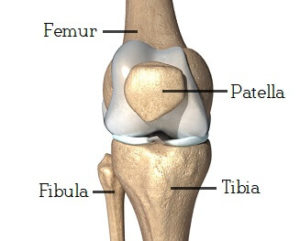Knee pain
The knee is a very complex structure and is constantly put under stress. It is imperative for movement and can be very vulnerable to injury. The knee joins together the thigh bone (femur), shin bone (tibia), fibula and kneecap (patella). Ligaments play a vital role in keeping our knees strong and mobile. The function of ligaments is to attach bones to bones and help keep them stable. In the knee, they give stability and strength to the joint as the bones and cartilage do not have stability on their own without ligaments.

We have four ligaments in our knee: Medial Collateral Ligament (MCL), Lateral Collateral Ligament (LCL), Anterior Cruciate Ligament (ACL), and Posterior Cruciate Ligament (PCL). We also have three fat pads in the knee that act as protective cushioning.
Knee injuries can be broken down into acute and chronic knee pains. Acute knee pain is as a result of a recent injury or accident and usually takes a number of weeks to heal. Chronic knee pain is a long-term pain, swelling, or sensitivity in one or both knees. Treatment may help reduce the symptoms but it may not completely subside. This is often due to arthritis but can also be attributed to an injury that has never completely healed.
How is knee pain diagnosed?
A physiotherapist may ask you a number of questions to assist in their diagnosis. These include:
- Where exactly is the pain located?
- Is it in one or both knees?
- Is the pain sharp or a dull ache?
- How is your walking, do you limp?
- Can you bend down without being in pain?
- How do you manage the stairs?
- How intense is the pain?
- What makes the pain worse and what makes it better?
- Have you had an injury in the past?
- How is the pain affecting your daily life?
- Is the pain constant or intermittent?
- Do you have any low back pain, hip, or ankle pain?
These are just some the questions your physiotherapist will ask you to assess what is causing so much discomfort. A treatment plan will be implemented but should pain persist for more than a few weeks they may refer you for an X-ray or MRI scan to assist their diagnosis and treatment plan.
Possible causes of knee pain:
- Fracture of the lower end of the femur
- Tibial Plateau fracture
- Patella fracture
- Patella dislocation
- Haemarthrosis (bleeding into the joint cavity)
- Synovitis
- Ligamentous strain
- Meniscal tear
- Irritable fat pads
- Osgood-Schlatter disease
- ACL injury
- Knee bursitis
- Patellar tendinitis
- Iliotibial band syndrome
- Osteoarthritis
- Rheumatoid arthritis
- Chondromalacia patellae
- Osteochondritis Desiccans
- Popliteal cyst
- Loose bodies
- Gout
- Hypermobility
How to treat knee pain
Suggestions for treatment include:
- Heat/ice therapy
- Rest and activity modification
- Physiotherapy
- Using a foam roller
- Keeping active within pain limits
- Using a crutch or stick if finding it hard to keep your balance
- Good shoes for support
- Reviewing orthotics
- Knee brace or support
How we can help your knee pain
We will do whatever we can to get you on the fastest route to recovery. Some of the treatment methods we use include:
- Mobilisations
- Strengthening exercises
- Myofascial trigger point release
- Pilates
- Cross-friction massage
- Stretching and range of movement exercises
- Acupuncture
- Functional exercises
- Taping
